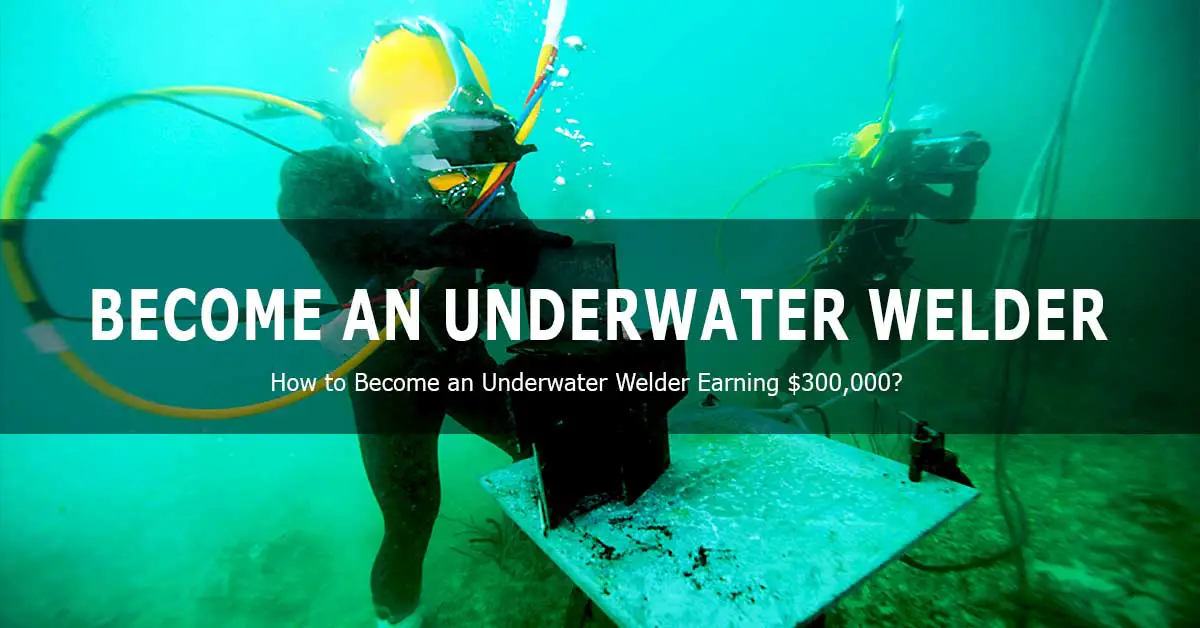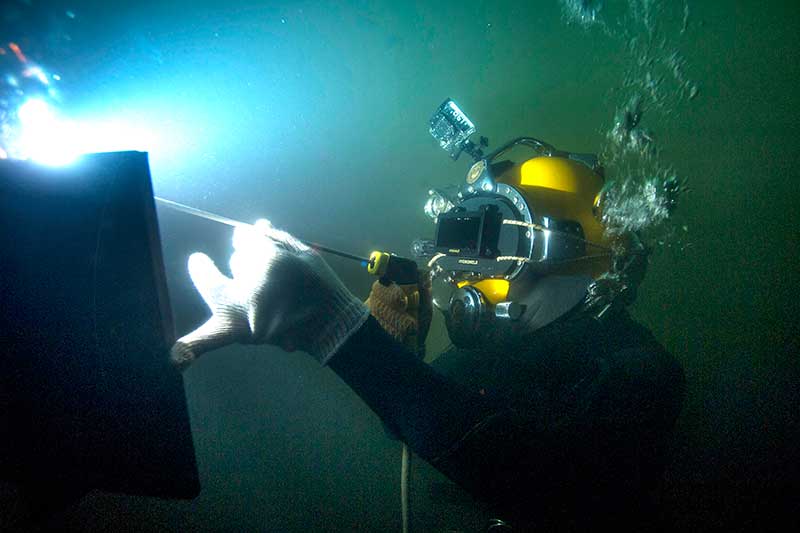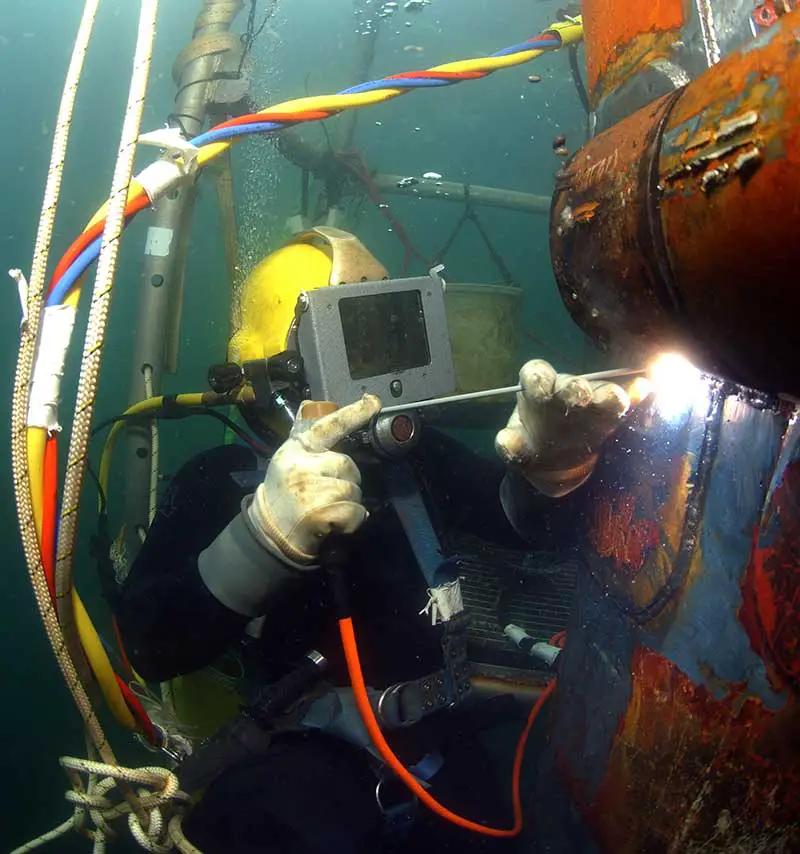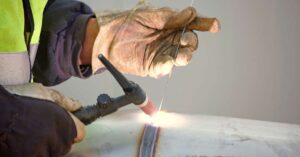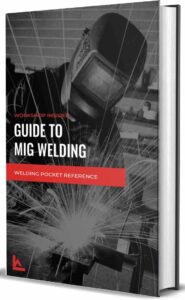When you see the structures built in the waters of rivers and seas, it looks nothing less than a marvel. There are many brave hearts behind those marvels, and underwater welders are one of the crucial links among them. To become an underwater welder, you must earn a welding certificate before registering for a commercial diving program.
For people who seek adventure in their work, underwater welding can be one of the options. This profession is full of adventure, and you have the scope to work in new places; however, you must have sound health and a willingness to take risks. A skilled underwater welder with welding experience can command high remuneration.
Underwater welders require extensive training to perform technical construction tasks beneath the water, including advanced welding knowledge and diving experience. They perform hyperbaric welding and other related tasks that can be used in various applications, including ship repair and oil platform construction.
What is the Salary of Underwater Welders?
There’s a growing demand for underwater welders around the world, especially with the need to maintain and repair damage to oil rigs and other massive marine infrastructures.
As per various sources and discussions with underwater welders, the annual salary of an underwater welder can range from USD 20,000 to 100,000, and the top 10% of underwater welders may command an annual salary of up to USD 300,000.
The annual salary of an underwater welder depends on their skill level, maximum depth of dive, employer and location of work, and the number of work days per year. Underwater welders can only work certain workdays during the year, depending on health and availability of work. The number of workdays per year will vary; hence, the salary also varies.
The career of an underwater welder
An underwater welder has professional training in welding and commercial diving; the latter (commercial diving) is more important. Underwater welders undergo vigorous training in diving and associated areas.
One thing you can do to prepare for an underwater welding career is to adjust your expectations. You may not get the job of a professional underwater welder job as soon as you complete your course; you may have to start as an apprentice and work your way up while improving your welding skills. Many experienced underwater welders become instructors, consultants, and engineers in underwater welding.
Since underwater welder is certified in commercial diving and underwater welding, they can become proficient in other skills such as underwater salvage, underwater rigging, pipeline welding /repair, and underwater tools (hydraulic drills, chainsaws, etc.). This makes them versatile and always keeps them on the job.
A job in underwater welding is a difficult one. Depending on your employer, you may be required to travel long distances, work long hours, and face several challenging conditions. But it is also rewarding as you complete tasks that only a few have the skills to perform.
You might also like to read: The Last Guide To Underwater Welding You Will Ever Need
How to become an underwater welder?
If you have an aptitude for mechanical work and an inclination to take the profession of an underwater welder, you can take the following steps. You must have completed your high school diploma and should be good at swimming (if you are not better, learn it!).
Visit the reputed schools’ website for underwater diving and welding and view the required medical certification. Take a print of the requirements and visit a doctor to see if you clear the requirements. Usually, good eyesight, no illness concerning the heart and lungs, and general good health are usually expected. Also, you should be young.
Once you are declared medically fit to pursue a career in underwater welding, the next step is to find a good and affordable institute. Check your budget and time. When you research an excellent institute for underwater welding, keep the following questions in the next section in your mind.
Questions to ask about the Underwater Welding School
1. Course Duration and Certification: Course duration and certification you will receive at the end of the program. The certificate must have international validity, and you can work anywhere in the world.
2. Instructors: How are the instructors who teach you about underwater welding? Read and study their credentials and their practical experience. Ask about their background to find out if they have extensive experience in underwater welding.
3. Training Facilities: Ask about the training facilities. Do they have in-house and river and sea facilities for practical training?
4. Tuition: What is the fee structure, and do they have scholarships?
5. Placement: Do they have a placement program? If so, what is the placement percentage in the last five years?
Preparation for a Job as an Underwater Welder
Select a school that teaches and makes you a professional commercial diver and underwater welder. It would be best to take tests to get yourself certified as an underwater diver and welder. The tests will be different for each. You can learn wet or dry welding techniques or both.
American National Standards Institute (ANSI) and American Welding Society (AWS) have made standards ANSI/AWS D3.6 to test and certify underwater welders in wet or dry welding or both. You must take this test (or an equivalent test in your country or your school’s place) to get certified as an underwater welder. Please ensure the certification is recognized internationally since you may have to work in different countries.
If you are already a certified commercial diver, you can approach a commercial diving company (that deals with underwater welding) to help you learn underwater welding and get yourself certified. You can join as an apprentice.
Types of Welding Carried Underwater
You’ll need to learn the basics of surface welding and the different techniques, as these will provide you with an advantage in the field and the ability to operate in the water safely. Here are some types of welding commonly used when welding underwater:
1. Shielded Metal Arc Welding (SMAW): It is also known as Stick Welding. This method uses a consumable electrode coated in flux to create an electric arc that melts the welding rod and base metal. The flux coating protects the weld from contamination and oxidation.
2. Gas Tungsten Arc Welding (GTAW): This method, known as Tungsten Inert Gas (TIG) Welding, uses a non-consumable tungsten electrode to create an arc that melts the base metal. If necessary, a separate filler rod is used to add material to the weld. GTAW produces high-quality, precise welds but is slower and more challenging to master than other methods.
3. Flux-Cored Arc Welding (FCAW): This method uses a tubular wire electrode with a flux core, creating a protective gas shield around the weld. FCAW is faster than SMAW and produces high-quality welds with less spatter.
4. Wet Welding: This method uses the same welding processes as above, but the welder works directly in the water. A unique electrode holder is used to insulate the welder from electric shock. Wet welding is faster and more cost-effective than dry welding but produces lower-quality welds due to the presence of water.
Skills Required to Become an Underwater Welder
Apart from the diving skills, which are a must for an underwater welder, you can have one or more of the following skills:
- Underwater welding (dry or wet, or both).
- Underwater cutting (oxy-fuel or mechanical cutting).
- Inspection and nondestructive testing (NDT).
- Underwater photography and video.
Related article: Underwater Welding Death Rate
Best Underwater Welding Schools and Underwater Welding Certification Programs
Underwater welding is a very competitive field, and the best way to land an excellent job as an underwater welder is to get trained in a good school with a good record of helping their students get a placement.
You must select a school with suitable Accreditation and Certification, excellent and experienced instructors, economic and fits your pocket, optimum course duration, and a good record of placements. Finding a school in your own country or another country nearer to you is preferred and affordable. The following are some of the schools you may explore.
1. The Ocean Corporation, Houston, Texas, USA
Established in 1969, this school has over 10000 alum members and a reputation among the top employers. The course offered by The Ocean Corporation lasts about 30 weeks. For more details, visit their website.
2. Santa Barbara City College, Santa Barbara, California, USA
This college has an underwater welder program, lasting about 32 weeks leading to the Skill Competency Award in Commercial Diving. For more details, visit their website.
3. International Diving Institute, North Charleston, South Carolina, USA
This school has different diving programs added with a separate underwater welding course. For more details, visit their website.
4. Canadian Working Divers Institute, Morpeth, Canada
This school offers Unrestricted Surface Supplied diving certification and has a 12 weeks program of rigorous training (6-7 days a week and 12 hours a day). After the diving certification, you may have to approach an underwater welding company for an apprentice job. For more details, visit their website.
5. Professional Diving Academy, Dunoon, United Kingdom
This school has underwater diving courses and an add-on skill course for underwater welding. For more details, visit their website.
6. Commercial Diving Academy, Australia
This commercial diving school is an excellent place to learn commercial diving, with an outstanding graduate placement record. However, to become an underwater welder, after getting the commercial diving certification, you have to join a company working in underwater welding. For more details, visit their website.
7. KBA Training Centre Pte. Ltd, Singapore
KBA has Inland/Inshore Commercial Diver Training (Level I and II) which can be completed in 40 working days. KBA has an option for those qualified with Inland/Inshore Commercial Diver Training (Level I and II) to opt for further four-week training in Scotland, UK, to become a qualified Offshore Commercial Diver.
KBA does not train you in underwater welding; however, with the certificate of Offshore Commercial Diver, you can join a company dealing with underwater welding as an apprentice. For more details, visit their website.
Final thoughts
Underwater welding is one of the most dangerous jobs on the planet, but it has good scope and opportunities. With the right skills, you can have a promising welding career as an underwater welder, and in later stages, as an instructor, engineer, and manager. However, keeping yourself in good health and safe is very important.
In addition to commercial diving certification, a prospective underwater welder will also need training and welding certification from the American Welding Society or an accredited institution.
There are many threats associated with underwater welding, and data shows a higher ‘underwater welder death rate’ and low ‘underwater welder life expectancy’ compared to other professions. However, there may not be any profession without the associated risk.
The risk in the case of an underwater welder should be managed by strict enforcement of safety measures. The profession of underwater welder may stay as long as an economically viable robot with all the skills of an underwater welder has yet to be invented by us!!!

